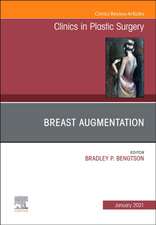Skin Necrosis
Editat de Luc Téot, Sylvie Meaume, Sadanori Akita, William J. Ennis, Veronique del Marmolen Limba Engleză Paperback – 12 oct 2016
This book is the first to discuss skin necrosis as a symptom related to a broad range of pathologies. Richly illustrated, it primarily provides therapeutic strategies and treatment algorithms for different clinical contexts. All chapters were written by renowned specialists in their respected fields and include detailed sample cases and essential take-home messages.
In light of the highly interdisciplinary nature of wound management, Skin Necrosis offers an invaluable resource for wound care practitioners and health care professionals across the fields of surgery, dermatology, internal medicine, and nursing.
Preț: 473.55 lei
Preț vechi: 498.48 lei
-5% Nou
Puncte Express: 710
Preț estimativ în valută:
90.63€ • 94.26$ • 74.82£
90.63€ • 94.26$ • 74.82£
Carte tipărită la comandă
Livrare economică 11-17 aprilie
Preluare comenzi: 021 569.72.76
Specificații
ISBN-13: 9783709119624
ISBN-10: 3709119626
Pagini: 304
Ilustrații: VIII, 302 p. 158 illus., 137 illus. in color.
Dimensiuni: 178 x 254 mm
Ediția:Softcover reprint of the original 1st ed. 2015
Editura: SPRINGER VIENNA
Colecția Springer
Locul publicării:Vienna, Austria
ISBN-10: 3709119626
Pagini: 304
Ilustrații: VIII, 302 p. 158 illus., 137 illus. in color.
Dimensiuni: 178 x 254 mm
Ediția:Softcover reprint of the original 1st ed. 2015
Editura: SPRINGER VIENNA
Colecția Springer
Locul publicării:Vienna, Austria
Cuprins
Definitions, physiopathology, imaging.- 1. Cyanosis congestion and skin necrosis. Is necrosis a venous congestion at the origin? (S. Meaume).- 2. Ischaemia reperfusion injury (T.K. Hunt).- 3. Dry vs wet necrosis (H. Justiniano).- 4. Extension in depth (S. Akita).- 5. X-ray imaging of necrotic skin (tbd).- Different clinical context of skin necrosis.- 6. Vasoactive drugs (tbd).- 7. Necrotising angiodermatitis (tbd).- 8. Rheumatoid and systemic collagenosis vasculitis (F. Massaki).- 9. Cold induced necrosis (tbd).- 10. Cryoglobulinemia (tbd). - 11.- Calciphylaxy (M. Romanelli).- 12. Necrotic burns (R. Horch).- 13. Purpura fulminans (tbd).- 14. Fournier gangrene (tbd).- 15. Envenimations (tbd).- 16. Toxic syndromes. Systemic management (tbd).- 17. Necrotising fasciitis (S. Akita).- 18. Tumoral (I. Fromantin).- 19. Infection and skin necrosis (D. Leaper).- 20. Post-injection Interferon, high-viscosity products, anticoagulants warfarin, coumadin, vasopressive drugs (tbd).- 21. Pyoderma gangrenosum (tbd).- 22. Trauma, degloving, scalps (R. Strockmayer).- 23. Pressure ulcer necrosis in geriatric, in paraplegic patients in ICU (tbd).- 24. Pressure ulcers in neonates (G. Ciprandi) .- 25. Arterial leg ulcer and chronic arteriopathy (B. Ennis).- 26. Necrotic skin and diabetes (tbd).- 27. Arteriovenous fistulae and vascular thief (tbd).- 28. How to manage necrotic flap failure (R. Horch).- 29. Kwashiorkor, HIV, and palliative care of necrotic nodes (tbd).- 30. Haematomas (S. Meaume).- 31. Necrotic and exposed tendon (L. Téot).- 32. Necrotic skin covering osteosynthetic material (G. Jukema).- 33. Abdominal wall necrosis (O. Chappuis).- Techniques applicable to skin necrosis.- 34. Dressings available to debride. The nurse domain (tbd).- 35. Different regulations of nursing debridement depending on the country (K. Tanaka, N.L. Tomaselli, E. Ribal).- 36. Surgical debridement (S. Akita).- 37. Negative pressure therapy. A contraindication to skin necrosis (tbd).- 38. Recent technologies in necrosis debridement (L. Téot).- 39. Stabilisation of necrotic tissue using cerium nitrate silvesulfadiazine (C. Trial).
Textul de pe ultima copertă
In recent years, wound care has gained increasing recognition as a distinct medical specialty. An understanding of the complex mechanisms involved in wound healing facilitates efficient assessment and treatment of patients with wounds, and skin necrosis can be considered the starting point in the entire healing process.
This book is the first to discuss skin necrosis as a symptom related to a broad range of pathologies. Richly illustrated, it primarily provides therapeutic strategies and treatment algorithms for different clinical contexts. All chapters were written by renowned specialists in their respected fields and include detailed sample cases and essential take-home messages.
In light of the highly interdisciplinary nature of wound management, Skin Necrosis offers an invaluable resource for wound care practitioners and health care professionals across the fields of surgery, dermatology, internal medicine, and nursing.
This book is the first to discuss skin necrosis as a symptom related to a broad range of pathologies. Richly illustrated, it primarily provides therapeutic strategies and treatment algorithms for different clinical contexts. All chapters were written by renowned specialists in their respected fields and include detailed sample cases and essential take-home messages.
In light of the highly interdisciplinary nature of wound management, Skin Necrosis offers an invaluable resource for wound care practitioners and health care professionals across the fields of surgery, dermatology, internal medicine, and nursing.
Caracteristici
Offers a comprehensive, multidisciplinary approach to the subject Clearly and concisely written chapters with demonstrative illustrations With contributions by an international team of leading experts in the field











